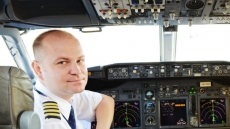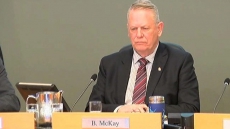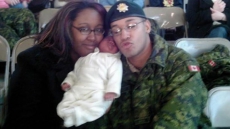So-called "lone wolf" attackers are unlikely to face terror charges under Canadian law, a legal expert said Tuesday as authorities continued to investigate a deadly mass shooting at a Quebec City mosque that Prime Minister Justin Trudeau called a terrorist attack.
Politicians were quick to denounce Sunday's shooting, which killed six Muslim worshippers and injured 19 others, as a terrorist act. But while the label sends a political message, experts said that doesn't always carry over into courtroom.
Prosecutors have not laid terror-related charges against the accused in the case, Alexandre Bissonnette, who is charged with murder and attempted murder. None of the allegations against him has been proven in court.
Police have not ruled out further charges but have also given no possible motive for the attack.
In order to be deemed terrorism under Canadian law, an attack must be politically, religiously or ideologically motivated and designed to intimidate the public or compel a person or government to act, and it must also have caused serious harm, said experts, who were not speaking specifically about the mosque attack.
The law is written in such a way that a person acting entirely alone is unlikely to face terror charges "unless they were giving money to or leaving to participate in a terrorist group," said Kent Roach, a law professor at the University of Toronto.
"A truly lone wolf attack cannot result in most terrorism offences, which require participation or support of a group or commission of an offence for a group," Roach said in an email.
Even if a person consulted materials from a terror group, that would not justify a terror charge, he said. "Inspiration alone is not enough — you would need some form of active participation or direct instruction or incitement to commit a terrorist act," he said.
Proving the ideological aspect is often the biggest barrier, said Wesley Wark, a national security expert at the University of Ottawa.
"It's often to meet that threshold that, in an investigation, there might be some delay between the initial laying of charges and the ultimate shape of the charges as they explore, as best they can, the motivation of the attack," he said.
In many cases there is a "powerful political dimension" behind the decision to lay terror charges, though the evidence determines how prosecutors ultimately proceed, Wark said.

"That background calculation would be to send a message to Muslims in Canada that they are not being treated any differently when they become victims of terrorism themselves — in other words, terrorism offences are not just offences conducted by Muslim jihadists but they can be offences conducted against Muslims themselves," he said.
Faisal Bhabha, an associate professor at York University's Osgoode Hall Law School who is also involved in anti-discrimination initiatives, said it's impossible to ignore the political and social context in which these decisions are made.
Men of colour and Muslim men in particular are more likely to face terror charges than white male mass shooters like convicted cop killer Justin Bourque, he said.
Should prosecutors decide to lay terror charges against Bissonnette, it would carry symbolic weight but have little other impact on his fate if convicted, said Roach. First-degree murder already carries a life sentence with no chance of parole for 25 years — the harshest possible sentence.
"Yes, a terrorism charge would send a political message, one that terrorism comes in all forms, but it would likely not add anything tangible in terms of sentence and would complicate the prosecution process," he said.





